|
I've been thinking a lot about endings.
Two people I know and the dear friend of another are wrestling with fatal illnesses. Together, they encompass three vastly different generations, the upper and lower age limits of my friends, and it's hard not to think of the two younger ones as having received a premature fate. But in the cosmic sense, does a few decades really make a difference? Couldn't we say all deaths are premature, as easily as we can pronounce all deaths perfectly timed? Isn't it a bigger deal that they, for a week or a half-century, actually existed? “Music is all I understand, because you don’t need words or experience in order to understand it. It just is,” says a character in Paolo Sorrentino's 2015 film Youth. We all find music that resonates on a fundamental level, and for me the list is large. The Bach keyboard concertos; toccata & fugue in D; Handel's Opus 4 No.6 for harp; Lana Del Rey's voice; the Kenny Drew piano solo on Coltrane's "I'm Old Fashioned;" Sigur Rós' Untitled, especially the second half; Arvo Pärt; any Roger Waters guitar solo; Eno's "Ascent;" and Radiation City. I first heard Rad City when installing my first major solo art show. Maybe that's where the positive connotation comes from. My friend, who ran the place, had them on. For me, hanging an exhibition is a favorite part of the gallery process. You already have the show; you've executed the work; now you're banging nails into the wall, aligning straightedges in the company of friends, exchanging small talk and silence at your own pace. The first couple times I saw them live it was by happenstance I was alone, but I soon developed a preference for going solo. It's so much more intense of an experience. I want to feel something in this life, and the potency of hearing that music, so special to you, with no intermediary… do you know what I mean? The sheer immediacy of it all, intoxicating. I don't want to describe their sound too much; better rather to imagine whatever music accomplishes the same for you. I will say they've been described as what happens "after your parents' record collection spends some time on the Event Horizon!" There's a sixties lounge vibe, in concert with ethereal voice work and rich, precise harmonies. Consider the conversation between the bass and drums here, the compellingly opaque writing here (an element I've found in more than one Portland band), or the specificity of atmosphere here. Note also their use of silence. In the way we discuss Thelonius Monk "leaving room between the notes," Rad City doesn't overload the sonic landscape. They leave space for their sound, room to feel. Songs and short films can more ably rely on mood to sustain their effect than a number of other art forms, and their music traffics heavily in that; something deeper here, just beneath the depth you can touch, lyrics and sounds which feel like a memory even as they're happening. Music, the solution we've come up with for articulating the thoughts that exist before language. I like the stuff, in other words. You know when you come upon a new song you can't get enough of, and you listen to nothing else for a week, and then the moment comes where you move past the beat and finally notice what they're actually singing? In that fateful moment of registering the lyrics, you will either like the song more, or less. Hopefully the former. You can't go back on that comprehension. That magical moment of understanding happened to me with one of their songs while watching it live for the first time. Sublime doesn't even cover it. After developing an acquaintanceship with the band from going to entirely too many of their shows, they invited me down to Portland for their big headlining concert, their last for a while as I understood it, perhaps because of the holidays, a show on their home turf, where they'd really pull out all the stops and play the stuff that normally never gets played. They did pull out all the stops. The venue was the famed 92 year-old Revolution Hall, and the presentation and execution of the music had a size to it, a heft you could barely take in, it was so beautiful. My friend and I stood in awe. Partway through the night, singer Lizzy Ellison announced this was their last show. I've been thinking a lot about endings. One year ago, as most of you know, I survived the Paris terror attacks, and have been reflecting further of late. Three relationships which have figured largely in my life reached their closure in different ways this year. And as mentioned above, a few of my favorite people are not long for this Earth. I stood in the front row, listening as Lizzy explained why, explained how things need to move on. "I hope you can respect that," she said. The Hall was a room of a few hundred friends and family. The setlist wasn't a string of hits, but designed for people who already loved the music and knew it well. Many in the audience knew the band personally, and the band itself is comprised, Fleetwood Mac-style, of a couple of couples. Love was in the air, love of beauty, truth, human connection and honest feeling. Imagine your favorite artist, their works formative and rejuvenating for you, in the midst of offering their best art ever... and then sharing this would be the last time. I realized then I needed to do what needs to be done always, in every good second of our lives: be here. Don't document it, analyze it, worry about it, mourn it; all that in good time. For the precious last minutes of the beating now, just be. I took no pictures, no video, recorded no music. Just drink up as much as you can, live in these final hours as deeply as possible, that you might know them to have been real. This night happened once, and you were there for it. Lizzy and Patti on either end of the stage, singing at each other. Cameron deep in the zone, speaking with his guitar. Cameron later on, waving to the crowd at the end, realizing this is it. The look in his eyes was one I've known myself: the surprise and realization that epochs, no matter how long or storied, can end in seconds. This wave, this clapping audience... this is it, bigger than we are and so fast, the chapter's final sentence, slipping out of our fingers already, elusive. Really though, could you ask for anything more? --- Update: further thoughts on difficult times....
0 Comments
I think it's important to keep in mind that although Mr. Trump is racist and sexist, not all his followers are racist and sexist.
You're a resident of Gary, Indiana, who's just been laid off from a job at the local steel mill. Your father's farm in Chesterton is long gone, and you're wishing your wife's family's hardware store didn't have to foreclose a decade ago. Walmart isn't hiring, the neighbors are on meth, and you have three kids at home, not all of whom have shoes. Only one of the presidential candidates is saying something about tax cuts and families. You see rural white poverty around you every day, and you notice liberals only ever talk about poverty in an inner city context, or with reference to the global south. You wonder why they never talk about rural poverty or mention places like the Mississippi Delta, the Ozarks, Appalachia, the Dakotas… you didn't finish middle school, but you suspect the rural poverty rate is higher than it is in cities (it is*), that the study of sociology has an urban bias (it does**), and you feel forgotten as you look at the abject living standards in your trailer and compare it to the left-wing lives portrayed on your neighbor's TV. Only one candidate is bothering to reach out to you. Do you care that he makes disparaging comments about demographic groups you've never even met? That's meaningless noise. Of course not. The government hasn't been helping you for years, and looking at your malnourished children you know you need to cast a vote. For change. I suspect scenarios like the above are more prevalent among the Trump voter turnout than the idea of a wealthy, uneducated teeth-gnashing white man who's always hoped for a Klan revival, regularly beats his wife, and enjoys spraying epithets on all VW beetles that have pastel colors. The desperation, living conditions, and chronic lack of education in middle America doesn't justify voters' mortifying tolerance of selfish hate, but it explains their willingness to subjugate it in importance. They're frustrated with America's deadlocked governmental infrastructure. Aren't you? Their vote for someone different and new stems from a similar place as my own vote for Obama in 2008. It isn't the same thing, but you see the similarity of desperation. There's a problem with the system, and your two candidate choices are someone from within that system, and someone outside it. What I'm trying to assert here is twofold: not all Trump supporters are hate-fueled animals. However, in casting their vote in the name of self-preservation, they have endorsed and enabled hate of the most egregious, un-American type. The hypothetical teeth-gnasher described above didn't comprise the entire Trump vote, but it has now been unleashed because of it. The bump in hate crimes since the election is worse than what happened after 9/11, according to the SPLC, a body that tracks such items. Gallup reports 42 percent of Americans afraid as a result of the Trump win; it's not hard to see why, as incidents numbering in the hundreds of harassment, swastikas, vandalism, whites-only enforcement, corralling of blacks on social media for future attacks, street threats toward Muslim women and their families, a push for lynchings, and worse… with only a passing denouncement by Mr. Trump ("stop it"), who told 60 Minutes "it was a very small amount" and "he had only seen one or two instances." Do you think Obama would have spoken like that if hundreds of hate crimes were committed in his name? Any other president? Two sentences on 60 minutes, followed by the hiring of white supremacist Stephen Bannon as his chief strategist. What to do? Be nice to people. Being kind has always been a necessary and satisfying obligation for us social creatures, but in 2016 in the United States it is something more. It is a matter of national urgency, a moral imperative we owe our fellow Americans. Folks like yourself– that is, women, rape survivors, gays, poor people, dark-skinned Americans from all over the world, Muslims, Native Americans, immigrants, Jews, trans folks, the disabled and more– are feeling a distinct lack of love right now. I was at a rally last week, called Love Over Hate. The mood was calm, accepting, peaceful. The afternoon light was fading into evening, and several hundred people of all the backgrounds above, and others (plenty of enlightened white males out there too, don't forget), coalesced as one in the twilight. People didn't look or talk like each other, didn't dress the same, weren't similar ages, and no one cared. You felt safe there, appreciated. I hope the future feels like that. We get there a step at a time. By leaving a bigger tip for your waitress. Waving hello at the fellow on the exit ramp, even if you don't have anything else to offer, because acknowledgment is the biggest offering. Pay for your gas inside, so you can give the man at the counter a smile. He'll feel better. These are the restorative acts we need now. ---- Further Reading (includes links above): Indiana: 10 Worst Places to Live in Indiana (Road Snacks) 10 Small Towns In Indiana Where You’d Never Want To Live (Road Snacks) Indiana Crowned Meth Capital of United States (TriState) More on Gary, Indiana, which has a poverty rate of 38.7%: Gary...May Cut Off Services to Nearly Half Its Land (Business Insider) Where Work Disappears and Dreams Die (The American Prospect) Rural Poverty: Rural Poverty: 11 Myths and Realities (Sullivan County) **Why the Left Isn’t Talking About Rural American Poverty (In These Times) Some Reasons behind Societal Neglect of Rural Poverty– and Rural America (Non-Profit Quarterly) The Particular Struggles of Rural Women (The Atlantic) *Rural Poverty Decreases, Yet Remains Higher Than The U.S. Poverty Rate (Housing Assistance Council) The State of Rural America in 2015 (Modern Farmer) Trump: 7 Key Takeaways from Donald Trump’s 60 Minutes Interview (Time) Donald Trump won’t take a salary as US president, and other news from his “60 Minutes” interview (Quartz) A White Nationalist Who Hates Jews Will Be Trump's Right-Hand Man In The White House (Media Matters) Behind Trump’s victory: Divisions by race, gender, education (Pew Research Center). Note the enormous education gap. Hate: Hundreds of Hate Crimes Have Been Reported Since the Election (NY Magazine) Racist Incidents Are Up Since Donald Trump’s Election (Time) Post-election spate of hate crimes worse than post-9/11, experts say (USA Today) Spike in hate crimes prompts special NY police unit (CNN) Jon Stewart! Some highly compelling insights from a reflective Stewart: Jon Stewart on President-elect Trump, hypocrisy in America (CBS) Almost exactly one year ago, I was sleeping fitfully in a small room on the upper floor of a hostel in the 19th Arrondissement in Paris. I may have been dreaming of my parents. Earlier, I'd been lying in my lower bunk studying the city map, memorizing where I'd explore tomorrow. Examining the metro map, the phrasebook. I don't travel with electronics; why let your phone do all the heavy lifting, when you know you can? I couldn't have known then that none of those plans would materialize. I didn't know that mere hundreds of feet away, ordinary folk like myself were being murdered, and that by morning there would be 550 newly dead or injured bodies, the lives of all who knew them forever altered, shaken by the size of history replacing daily life. The city would shut down for three days of mourning, by its own will and that of its leaders. Empty streets in every direction, hollow, missing human life and heavy with something else; a fraught and massive bulk invading our thoughts, the nameless weight that makes grown men stand still. For me there is before Paris, and after Paris. The event began when I was four blocks away at a laundromat. The city was loud enough that you couldn't hear gunfire. Laundry is important to me when traveling: I pack only one pair of black jeans regardless of duration of travel, plus one pair of sweatpants to wear while washing those jeans. I was enjoying the mix of domestic bliss and urban exposure laundromats offer. That's what I was thinking about, zen-ing out to the rotating whir, trying to understand the French dryer instructions. I changed and met a hostelmate for dinner, as planned. It was Yi-Syuan's last night in Paris, and we treated ourselves to a "real French dinner." Our restaurant was hardly any different from the ones down the street which got shot up– festive, busy, delicious. She was a student about my age from Taijung, also traveling alone. We sat by an open window, oblivious to history. We knew we'd never see each other again, which meant we could discuss anything, anything at all, our deepest secrets, confusions, fears, hopes. It was a dinner for the ages. I've never had another like it. Mere blocks away. Why did I live? Why did she live? Imagine the nightmare for the 137 who were dying, the last moments, the final view from dying eyes, the final view and also the worst. They met their end on a Friday, out on the town as I was, taking in food and good company in that huge, beautiful, complicated city. Until that night we all had something sacred, which we held dear in our different ways: a notion of a just universe. How do we keep that notion? Where do we go now, and how do we think? There is something I don't understand. I cannot, for the life of me, grasp why such horrible badness befalls such good people. I realize this dilemma has been debated since the dawn of civilization, implying no one else knows the answer either, but that does not comfort me. There are times when I am haunted by the unblinking silence of the world. I try to remember all are good and bad, and none are good and bad. Our nuances transcend such categorizing. In my own life, I am convinced it is the best people I know have suffered the worst agonies. It seems obvious to me, and yet it is possible everyone feels this way. I try to recognize I know the misfortunes best of those whom I love most, that everyone else has their misfortunes too. The photograph above was taped to the base of a statue, one of thousands of other objects, mostly letters, flowers, and candles, together forming an impromptu memorial in the center of a large plaza.* There were not many photos, and thus this one caught my eye. I knelt down low to look at it. One of those faces, or maybe all of them, were alive earlier that week. The mourning figures around me, the candles and slogans and statues and blood all receded into my periphery. There was only this picture. I thought of Maud. I looked at their faces, young people with goals and dreams. I thought of the men who killed them, young people too, children once. I haven't ever cried in the company of a thousand strangers, but I did then. These people are my friends, I thought. Why did you destroy them? Why did you break the lives of all who knew them? You are my friend too, in that you are human. Why did you do that? Did you not know it would break you too? Have you ever known anyone to get away with anything, ever? When we discuss the meaning of life, we are usually talking about the meaning of tragedy in life. Aside from the question of why we exist in the first place, the rest generally makes some kind of sense. But what to make of the suffering foisted on good people? This cruel riddle is both smaller than the fundamental query of why we're here, and at the same time more relevant. Because if we knew the answer, we would achieve the miracle of being at peace with all acts of man and nature. The answers and religions we offer each other are suppositions, the best of them based on experience, each carrying their different rings of truth. I recall now the definition of optimism I've written about before, a creation my parents and I once came up with: being comfortable looking at truth, even when it's negative. I recollect the Taoist principle of accepting everything in front of you without wanting it to be any other way. These maxims make life easier, but one day you will come upon a situation where abiding by them will feel like a crime. A dying loved one; bodies in the streets. It is so hard sometimes, so impossible. But we must do it. We have to try, or we will never find peace. -- *Place de la Republique. For more photographs of Paris at the time of the attacks, click here. Thoughts written immediately after the event. An open letter to terrorists around the world. -- An excerpt from a conversation circa 1883, between Indian mystic Ramkrishna Paramahansa and his chief disciple Swami Vivekananda, which might be of interest: SV: "Why do good people always suffer?" RP: "Diamond cannot be polished without friction. Gold cannot be purified without fire. Good people go through trials, but don’t suffer. With that experience their life becomes better, not bitter." SV: "You mean to say such experience is useful?" RP: "Yes. In every term, Experience is a hard teacher. She gives the test first and the lessons afterwards." "Whenever any form of government becomes destructive of these ends [life, liberty, & the pursuit of happiness], it is the Right of the People to alter or to abolish it, and to institute new Government."
That's not from some anarchist's cookbook. That's the Declaration of Independence of the United States. Thomas Jefferson writes further in the same document: "when a long train of abuses and usurpations, pursuing invariably the same object, evinces a design to reduce [the people] under absolute despotism, it is their right, it is their duty, to throw off such government, and to provide new guards for their future security." These are words from one of the central founding documents of our nation, and they are not subtle. We exist, the document basically says. We have rights and we're going to do something about it, and these are the reasons why. In 2008, we danced in the streets because we saw evidence that change can happen. The American dream had been dying slowly, but it was alive again. It had been proven. You could be the black son of an immigrant in the south side of Chicago and become President of the United States. Anyone could make it, truly. I remember the rich, deep pride of excitement I had the morning after. I remember an African-American man getting on my 545. We beamed sunshine at each other; neither of us could hide it. He said, "how you' doin'?" And I said, "man, I'm so happy I can hardly concentrate on drivin' this bus!" Do you remember that day? Even if you didn't vote for the man, you can see the value of the fact of his winning: the American dream had become, at long last, a teachable moment to so many more Americans, a reality. We danced because there was a new, exciting, powerful figure who would effect great change for us. But the situation is different today. There is no longer such a figure we can look up to. What does that mean? It means we have to be the ones making the change. Do not complain about the outcome of this election if you were able to vote, and didn't. Less than 25 percent of registered voters voted, and there were seven million Democrats who voted in 2012 who didn't do so this time around.* Would the outcome have been different if they had shown up? The upper limit of our involvement in where this country goes should not be clever aphorisms on Twitter or sulking on Facebook. For cynical know-it-all pronouncements of the "I knew it all along" variety, please recognize that no one cares. Cynicism is too close to an opposite of productiveness. Will we let complacency be the defining watchword historians use to describe our generation? That's how tyrants get their way. How would our parents, the children of the sixties, behave now if they were our age? Will you march? Will you carry a flag, maybe get arrested? There may be another draft. What will you do with the card? Stand unwavering in the face of injustice? There was an anti-Trump rally right here in Seattle not more than an hour after the results. Meanwhile, the Canadian Immigration website crashed. I see those as two very different responses to the Trump win. Women in America have just been demoted to de facto second-class citizens. Regular Americans may lose what healthcare they have. Every one of us comes from immigrant stock, and those of us taking that hard journey today deserve as much a chance as our forefathers did. They deserve humanity. Families risk being torn apart. Political support for Black Lives Matter is over. Gays may lose the right to marry, and the tax breaks and insurance opportunities associated. Tax cuts will weaken our schools, roads, hospitals, fire and medical response and more. Protective rights for women are in the balance; certainly the right to have control over their own bodies, and perhaps even the right to vote. The Electoral college has proved itself fatally damaging to the country, twice, in only twenty years. Maybe none of the above will happen. Mr. Trump's 60 Minutes interview from Sunday– a numbingly extraordinary exercise in backpedaling– was encouraging, and indicates he may not be as tyrannical as many fear. But if he is, the question to ask ourselves is: Did Martin Luther King, Jr. throw up his hands and move to the Bahamas? "Rebellion to tyrants is obedience to God," Thomas Jefferson forcefully wrote. He writes in the Declaration above of our duty to maintain fair and just government. The founding principles of our nation demand action otherwise. Nearly a century later, Abraham Lincoln spoke much the same: "This country, with its institutions, belongs to the people who inhabit it. Whenever they shall grow weary of the existing government, they can exercise their constitutional right of amending it, or exercise their revolutionary right to overthrow it." This country was built in the spirit of a frontier town by radical, strong-willed, idealistic men who staked their reputations, beliefs, families and lives on a hope and a prayer. What we have now is not merely an opportunity, but a duty to act, as outlined and impelled by those same men. Half the country (actually, about an eighth*) has spoken. Now it is our turn. When global news networks report protests numbering in the thousands in major cities all over the United States, that resonates. It sends a message, to those in power and to the world abroad, that there are Americans who believe in something that's been overlooked with this election: Decency. This is our time, our generation, and I'm not referring to age groups. I mean everyone who has the good fortune to be alive today, that they might alter the course of our nation's history that will do our future generations proud. Why do we protest now, before he's even in office? Not to change anything, but to voice our dissatisfaction with a president who doesn't apologize for assault, who advocates racist, sexist, unconstitutional views toward our fellow people. To let it be heard that there are those among us who don't approve of such things. If things go as is, or get worse, taking to the streets might be the most American thing to do. -- Stay tuned. I know I said there'd only be three political posts, but the situation is too complex. Nuance is missing from a lot of the national discussion right now. I'm beginning to see reasons to be optimistic and wish to share. We'll also hear an international perspective from our first ever guest post from a German correspondent friend in Berlin. More soon! *Laziness is not entirely to blame here. See post below for details. My immediate emotional response as to why Mr. Trump won November 8th's election was that there are far more racist, sexist, and xenophobic Americans then I thought there were, and that they showed up in enthusiastic droves to elect a similarly racist, sexist, and xenophobic candidate who reflected their views.
It's a little more complicated than that. I think we all thought that America was at least a little more forward-thinking on these issues than the election appears to indicate, and I believe that we might be right to hold that assumption, despite the presidential result. Consider these points: 1. Less than twenty-five percent of registered voters voted. That speaks for itself. Trump's election doesn't represent the unified voice of an entire country. It doesn't even represent half of the country. It represents, at best, an eighth. 2. This was the first election to take place after the dismantling of the Voting Rights Act. In 1965, Lyndon Johnson signed a piece of legislation designed to prevent racial discrimination in voting, and which was pretty effective at doing so. Widely considered the most effective civil rights legislation ever enacted, it forcibly prohibits state and local governments from enacting discriminatory laws towards voters of color or language minority, especially in the form of literacy tests, requires bilingual ballots, and contains numerous other provisions added over the years to bolster the Fourteenth and Fifteenth amendments. Since 2013, new rules have been implemented, all with Republican support and in states which supported Trump, which largely render the Voting Rights Act ineffective. Wisconsin, for example, now requires photo IDs. Kansas now requires proof of citizenship. In Ohio and Nebraska, early voting periods have been reduced. All states with crippled Voting Rights Act restrictions swung Trump, as these sorts of limitations really only affect the poor and persons of color, who overwhelmingly tend to lean Democratic. I'm not saying these rules transformed the election's outcome outright, but it should be an obvious truth that many voters weren't heard, and a reasonable explanation for why certain states we don't really expect to go red did. And most crucially: 3. Mr. Trump hasn't actually been elected president yet. Here's how it works. On November 8th, we cast votes to choose electors. Washington, for example, with twelve electoral votes, has twelve individuals picked by the winning political party, who pledge to vote in accordance with the popular vote. On December 19th, these electors then cast their votes. Those are the votes which decide who becomes president. An elector is not required to vote in accordance with the popular vote of his or her state. Although they pledge to do so, they can choose to deviate. An elector who deviates from his state's popular vote is a faithless elector. In 30 states, a faithless elector is fined $1,000 for deviating, with no further penalty; in the remaining 20 states, there is no fine. The electoral college was created to ensure against the election of a person unfit to serve, or, as James Madison put it* in 1787: "an obnoxious individual." Um, could this be what he was referring to? How many somersaults have Franklin, Jefferson, and Washington all done in their graves since Tuesday? The December electoral vote has since the dawn of time been a mere formality. Only nine electors have deviated in the last 100 years, and none of those deviations were numerically significant enough to influence election outcomes. However, the electoral college could elect Clinton if they chose and be constitutionally protected in doing so. Our current situation is exactly why the Electoral College was invented, though using it for that purpose would be unprecedented. Change.org is currently circulating a nationwide petition requesting the Electoral College exercise their legal right to vote in Hillary Clinton, for the following reasons: 1. Mr. Trump is unfit to serve. 2. Doing so would accurately reflect the popular vote. There is no precedent for this, but there is also no precedent for what is happening right now. There is an opportunity here. Ah, drastic times, and the drastic measures they call for. To learn more about the petition, click here. --- Sources & further reading: Conservative folks– we like you too! Consider this petition: Petition to Put a Republican in the White House that is Not Donald Trump The New York Times: After a Fraught Election, Questions Over the Impact of a Balky Voting Process. Overview and analysis. Vocativ: No, Voting Rights Restrictions Did Not Cost Clinton The Election. Voting Rights Act fallout explained. Vox: No, the Electoral College won’t make Clinton president instead of Trump. Perspectives on the Electoral College. Yahoo: Millions sign petition urging Electoral College to elect Hillary Clinton. Petition background. *Snopes: The Electoral College and the Popular Vote. How it all works, with discussion of the petition. I still have (many!) more thoughts on the National Tragedy, but wanted to take a moment regarding today's holiday. I haven't forgotten that we now have a US President who's endorsed by the KKK, but I don't want to let Trump overwhelm the contributions ordinary folks have made for eons. Whether the wars they fought in were misguided, just, or otherwise... the sacrifices were real.
To wit: This was back when American Sniper came out. I have a bunch of reservations about that movie, which you can read here. Regardless, I was sitting in the theatre, Cinerama, left of center, toward the front, where I like to be when I go to films alone. To my right was a boy in his twenties and his companion, a woman who looked to be in her early eighties. As the end credits played, I could hear them speaking to each other. "What'd you think?" The boy. "It was good." "Yeah. I couldn't help but tearing up a few times." "Yeah." He elaborated. "I couldn't help thinking about him, the fact that he was actually over there, and he went back over there… it just kinda blew me away how many times he went over there and came back. Made it back." In a quiet, scraggly voice, the elderly woman said, "yeah, you know, it really was like that, with the kids carrying the bombs. You had to be careful, 'cause often they would train children to do that. Sometimes we just didn't know, and we had to make decisions like that." I had misheard the young man. He wasn't saying he, in the above sentence. He was saying you. How many times you went over there, and made it back. "Well," he replied, "I just didn't realize how close I was to losing you. I was too busy thinking about dad trying to get me to eat spinach for six hours!" They stood slowly. He waited for her to get situated, gave her time to rise at her own pace. After they were both standing I approached them. She was a diminutive, decrepit shadow of a woman whose presence you might not even notice out in the world. But she was a powerhouse, had suffered, lived large, known the tortures of conscience, been placed in situations and sacrificed to a degree she didn't know possible when she started out. She was at the center of it all, once, and painfully. I don't often say "thank you for serving," but I needed to now. "Hey," I said, almost whispering in the great big dark room. "Could I shake your hand? I'm sorry to interrupt, I couldn't help but overhear. Thank you for serving." "Oh. Thank you," she said, in her aged voice. "It means a lot," I said. "Have a good day, you guys." They walked out together, slowly. -- A vet in his early sixties came aboard my bus a short while later. He mentioned a toe injury he's had since Vietnam. He'd finally gotten some surgery for it, and was feeling better. The movie theatre incident was still prominent in my mind, and I said it again: "Thank you for serving." He lit up. He thanked me. Then he said, "You're the sixth person to say that since 1979!" This is the first in a series of five posts. I resolutely avoid politics here on the blog, but the Trump win isn't political. It's more than that.
I saw the brightest lights of my city in mourning. There was a stone in my chest, and everyone else's. Could I really say "good evening," with a clean conscience? In stark contrast to 2008, when you couldn't go anywhere on the Hill because of how many people were dancing in the streets, last night was a city emptied out, devastated. There were people about, but they stood off by themselves, pulling on a cigarette gazing nowhere, wiping their eyes as they crossed the street. Here was a man and a woman standing facing each other on the sidewalk, their foreheads touching, the woman heaving with grief, the man with nothing to say, sharing her desolation in crushed silence. We were all alone, together. I was reminded of 9/11. The streets felt shattered then, too, but today is different. Today's disillusionment is a sobering realization, the disillusionment not of learning about others but of ourselves: there are monsters afoot, and they are near, in our backyards and in our blood. I speak not of other voters, you understand, but rather of attitudes. The world will remember when the United States of America elected a man who condones the rape of women. Can you believe that sentence is not an exaggeration? A man who speaks of it casually, who boasts about sexual assault, who sneers with hate and ignorance at blacks, latinos, all minorities, the impoverished, and more. There was a time when Americans got worked up over Reagan having a second wife, or Clinton having affairs with interns. How quaint. At least those presidents regularly made comments that were consistent with the values this country was formed on. Up til now US presidents were career politicians who started out with ideals, who at least had a desire to better their country. They didn't host Wrestlemanias or spend their energies building casinos and golf courses, and they definitely didn't keep a collection of Hitler speeches by their bed. Now, the lead American figure in the "art of compromise" is someone who sues comedians when they make fun of him, urges his supporters to beat up protestors at rallies, defended the Japanese internment camps, doesn't know how many articles there are in the Constitution, praised North Korean dictator Kim Jong Un, and said of women:* "You have to treat 'em like shit." Jimmy Carter this is not. What will we tell our children? The fact of Trump's presidency normalizes and legitimizes abuse. We used to be able to tell young people that rape and assault allegations would ruin their careers. That lying, cheating and stealing won't get you anywhere in the long run. We can no longer teach children they shouldn't harass others, sexually assault others, brand folks who don't look like us as criminals.... You can now do all those things, loudly, and become President of the United States. Will victims of harm and hate feel comfortable coming forward now? Will men who think women's sole purpose is to serve and please them feel that much more empowered? Maybe they'll grow up knowing better, despite our grave error. They'll wonder how their parents and grandparents got so backward all over again, after decades of real progress. How did they let this monster in, they'll ask. How will the children of future generations regard us? What will we look like? Will we look like Germany in 1932? I don't think so. I believe we will look worse. The difference is we, today, knew everything going in. People will speak of the day when America elected a reality-TV host with no political experience, who bragged his ignorance, who made Napoleon look humble. Do you imagine this man sitting down for peace talks with dignitaries from other countries? Do you see a man who's had his way for his whole life– whose catchphrase for decades was "you're fired"– listening to advisors on foreign policy? Caring about foreign policy? Let's not pretend there's a shrewd businessmen under that spray tan, either. His key assets are inherited, his current wealth comes from celebrity, and despite his business education he's still filed for bankruptcy multiple times. If business isn't his area of expertise, well, what is? He was the punchline of the world, and now the globe looks on with disappointment, and confusion. Surely America must have known he's a joke. His election is a message to the world: "we think this man a capable and viable representative." Trump isn't the punchline of the world anymore. America is. He is a mirror for certain prevalent tendencies now, of ignorance, chauvinism, and insular, apathetic narcissism. We wish to elect not ourselves, but someone better than ourselves. Mr. Trump is not that. Play me no music today, no false consolation, no empty words of how this is all fine. Let me sit here, and watch the rain. I'm not ready for the bright side yet. To be continued. Stay tuned. -- *Slate: 230 Things Trump Has Said That Make Him Unfit to be President. You remember the man. My first meeting with him involved me carrying his collapsed body off the bus. We further bonded when he had trouble finding my eyes.
"Mister Nathan!" He's back. I love that he remembers my name. I love how he slurs out the formal appellation 'mister,' in the perfect conflation of respectful address and garbled colloquialism. We're about the same height, and may even be the same age. A clipped Somalian accent, short of breath; no one else talks like him. It's downright endearing. He staggers forward on watery sea legs today, though we're on the dry land of Fifth & Jackson. I'm on the curb waiting for my bus and a friend is waiting with me when he shuffles forward. I reply to his call. "Abdilahi, hey!" He corrects me. "Abdi-LAhi!" "AbdiLAhi, how are you?" "Mister Nathan, how are you?" "I'm good, my friend, how are you?" "Mister Nathan, I lost one of my eyes!" "I'm so sorry!" "Yes, I lost one of my eyes!" "Abdilahi, I'm very sorry! This is very serious!" "Yes it is very serious!" He shows me his face, removing his aviator shades. The left side is swollen, stitches, caked blood, the eye still in its socket but barely visible, a clouded slit clearly blind. It still moves though. It appears to be looking at me. "What happened?" "I fell down some stairs." I've heard that one before. But I'm more concerned about next steps. "Did you go to the hospital? To the doctor?" "Yes." He said something confusing about medication; I think he didn't want to take it. "Abdilahi, this is very serious. It's important to listen to the doctor on this one. You want to have both eyes. I mean I'm glad you still have the other eye left over, but you really wanna have two eyes." I resist the impulse to start talking about dimensional and binocular vision, judging distance on curves and so on... instead I just say, "it's important to go to the doctor. Did you go to the doctor?" "Yes, I went to the hospital. Is it going to be okay?" "Yes, it's going to be okay." I could tell he put a lot of faith in my words. I felt out of my league. Where's Mother Teresa when you need her? He says again, "I just want to know, Mister Nathan, is it going to be okay?" Give him the comfort he wants. Rise to the occasion. I've been sainted once before... "Yes, but you have to do what the doctor says. I know sometimes we don't want to go to the doctor, but this time its important, your eyes are important, they are fragile." "Is it going to be okay?" "Yes, its going to be okay." I spoke out of genuine concern. He's extremely hard on his body. "Be careful these days, go slow, get sleep, eat, it's very important to take care of yourself." The endearing accent: "Nathan my whole face is very swollen." "Yes, I can see that. It's not good right now, but it's going to get better. This is the bad time. It's gonna get better." "Thank you, Mister Nathan. That is what I wanted to know! How are you?" Pointing to my friend, adding: "who is she?" "This is my friend. Maria!" "Maria. Nice to meet you." "Nice to meet you." "You are…" Maria says, "I'm his cousin!" Just run with it. "Yeah," I said. I don't know why she said that. We're not cousins. We're friends. Family connections are easier to explain on the street than friendships though, especially between sexes. If you're not family, everyone thinks you're married, or you need to go get married. "Nathan, what is your, where is your family from?" "Korea. But she is from the other side of my family." "Yeah," nods Maria. "What is the other side? Europe?" "They are from Hungary, yes," I reply, truthfully. "Far back." "Hungary. Europe! You know Josef Stalin?" "Who?" He pronounced it with a Y. Like the Norwegian Jan, or the Spanish Jessica. "Yosef Stalin, you know Yosef Stalin?" "Um, yeah. A little." "He is from Europe too." "I guess he is. Italy." Reader, I was thinking of Mussolini. I know. Give me some rope here! Sometimes I mix up my autocratic totalitarian dictators.... Abdilahi looked at Maria. There is a tightrope tensing; conversations on the street can take turns you never dreamed of, in a flash. He says to her, "you look like. You look like, Hillary Clinton!" "Um," said Maria. Not all fifty-year olds like being physically compared to sixty-eight-year olds. "Must be the hair," I quipped. "Yeah, must be the hair," said Maria. "Hillary Clinton," said Abdilahi. "It is nice to meet you." The clouded slit of an eye, expressionless, peering out. "Yes, nice to meet you." Abdilahi's a sweetheart, but he doesn't leave quickly. "Maria, it is nice to meet you. If you don't mind." He says the last phrase, finishing off the pleasantry, but it comes out ominously. A one-eyed man bleeding from his other eye socket holding a bottle of Evian water filled with liquor can add to that. Maria is confused, and he repeats himself. "If you don't mind." "Uh," she says. Me: "he's just saying it's nice to meet you if you don't mind." "If you don't mind," he says again. You know when you're speaking a second language, and you can't explain it any other way but to say the exact same thing all over? "Oh yeah. I don't mind at all, it's very nice to meet you too!" "Thank you. I'm sorry to interrupt you guys. Mister Nathan, thank you. It is good to see you, my brother." "Good to see you too!" "Thank you for telling me. It's going to be okay?" "Yes. Everything is going to be okay." "Thank you, Mister Nathan." "Be careful!" "I will, Mister Nathan." Aw. He's a big teddy bear. Clinton comparisons and Stalin non-sequiturs notwithstanding, he deserves binocular vision as much as anyone. I hope my words offered some measure of comfort and grace. I hope they helped, but I don't think he needed them desperately. There's something about how he conducts himself, even in the lowest of times, that I appreciate. The guy's newly missing an eye, and he's making sure to say the right pleasantries in meeting my friend. A little bit of dignity, or a lot; you can always carry it with you, though you may lose all else. Is it so silly, when we really think about it, to mourn the passing of a coach type? Think back to your childhood haunts. The wind chimes on Grandma's porch. The smells of your home, wherever it was, during the best years of your life. They form the texture of our existence, these spaces. The building blocks, how we make it personal. Even if you never rode them, it's likely Metro's sixty-foot Breda bus made an impression. They were ancient. They were massive. They looked so big and so heavy you'd think they should be illegal, and they were. At 64,350 pounds with a full load of passengers, they destroyed roads and violated weight limits all across the county, forcing Metro to pay fines every single service day for a couple decades. They were unstoppable tanks that could barely get started; they employed a different sort of transmission than what we ordinarily know, which is why you'd get all the way up to fifth gear and the bus would still only be going twenty-five. You needed to pack a lunch for some of those steep hills. The manufacturer's top speed was set at fifty-five, which in real life meant something like fifty-one or fifty-two. Forget schedule. "They were stinkers from day one," a senior operator not-so-wistfully told me. They predated ergonomics and have destroyed countless drivers' shoulders, knees, lower backs…. And oh, how I love them so. They live now only in our thoughts: the last Breda coach, ever, ran its final trip last Thursday on an inbound 36, sometime around 1pm. The photos you see here were taken by me between 1998 and last month. As an operator, my body certainly won't miss them, but I will. I'll miss the fact of their colossal size. Twelve feet tall rather than ten, four steps instead of three, the high center of gravity that felt like a streetcar in prewar Europe; I'll miss the stained and paint-stripped floors, panels gouged with twenty-six years of peeling and knifepoint graffiti, lint and litter becoming one with the bus, fusing together in the dusty nether corners. A biologist's dream, I'm sure. Think of the histories they've borne witness to, the wars and presidents their passengers have discussed. People sat in these things reading about Tiananmen Square and the overthrow in Romania. They asked each other what the internet was. Made in 1989 by the Italian company Breda, which specialized in trains, the Bredas were the first dual-mode buses in North America. The only other Breads in the world are in Milan, pictured below (from 2015, as they were being phased out): Only the Seattle coaches had a rear axle connected to a diesel drive train and a center axle another power source: an electric motor, which came to life when the poles on top of the bus were raised up to trolley wire. They were a custom order designed for Metro's downtown transit tunnel, which opened in 1990, and featured trolley wire running its length to allow coaches to whisk through without emitting exhaust fumes. The process of raising the poles to the wire at either end of the tunnel wasn't always flawless, but wasn't that part of the charm? As a child, it was a treat to feel the bus shift into electric. You were sitting in the same vehicle, but all the sounds changed. No more rumbling, shifting, or engine vibrations; now the steady hum of current, accelerated torque, and clicks of poles switching tracks. Out-of-towners marveled, trying to figure out what was going on. The initial order was for 235 buses. From 1990 to 2005 they traversed all over the county, breaking down, giving millions (not an exaggeration) of rides, raising the poles and lowering the poles as they went in and out of the tunnel, tearing apart drivers' shoulders, and proving the bane of every automobile who ever got stuck behind one, wondering why the bus in front of them was taking more than a mile to get up to fifty (again, not an exaggeration: on the 267 from the West Lake Sammamish onramp to SR-520 & 51st, there was no way the bus was getting over twenty mph, despite the 60 mph speed limit). Part of the issue was weight. In the analogue days, dual-mode meant, quite literally, doubling everything: there weren't just two engines, but two of everything: brake systems, transmissions (as much as an electric motor could have one), all the connective assembly for each, and more. In 2005 the vehicles were replaced by new Hybrid diesels which you still see in service today. At a downright puny (well, comparatively) 44,935 pounds, these are veritable jackrabbits. They're little sports cars. They number 2600-2812, and are identifiable by their roof-mounted battery, instead of poles. Yes, they make more sense, but they're not as endearing. Though they do have an electric assist that allows them better acceleration when operating under forty mph… admit it, friend. They lack character. There's something about design from the pre-digital period I enjoy: look at the knobs and dials on cameras from back then, or the unfussy current collection boxes atop the bus. The sharp edges and corners, so un-aerodynamic. And so hot. The person who isn't trying so hard to look good ends up being the most dazzling; you know what I mean. And so it is with bus design. Listen to that "ding" of the bell chime: that's a real bell. Not everything needed to look like a slick sci-fi movie. The dashboard was drenched in toggle switches and buttons, in a triumph of function over form; today's dash is sleek but limiting by comparison. The driver could engage the differential lock, disable the dynamic brake, cutout the retarder, and more– no longer options today. Upon being replaced in 2005, 59 of the 235 Bredas were selected to continue service as electric-only trolleys, replacing the aging fleet of 46 German MAN trolleys from 1986, pictured below. I'm even more attached to those than I am to the Bredas; good thing you don't have to listen to me rapturously proclaim my love for them here.... The 59 remaining Bredas would now be used on trolley routes rather than tunnel routes, and drive only while on the wire– the diesel engines, transmission and radiator were removed, making them 14,000 pounds lighter. Great. The buses were retrofitted with new signage, seat upholstering, Kiepe fiberglass poles (more flexible than steel, better at staying on the wire), updated driver's area, and reduced seating to allow for more leg room (people don't squeeze in quite like they used to!). The haphazard, in-house nature of this refurbishment led to the moniker "FrankenBreda." Say it with love. With 59 buses, you'd think maybe 55 or so of those would always be in working order and ready to hit the road. Wouldn't that be nice. But being that these are Bredas, no amount of cute new upholstered seats could alter the fact that they were king of breakdowns, and always would be. A standard bus fleet requires a ten or fifteen percent "spare ratio–" an extra quantity of buses on the lot to mitigate breakdowns. Ten or twelve buses for a fleet of a hundred, for instance. Bredas broke down so much Metro needed a thirty percent spare ratio– to address the constant breakdowns but also to have available for scrap parts. Spare parts for a bus made by an Italian train company while the the Berlin Wall was still standing are hard to come by. When you step into the bus to start your shift and notice that the odometer reads over 600,000 miles, you're not really expecting this thing to work anyway. No need, for instance, to write up the damage to the cracked bumper below; you would be more surprised if everything actually looked good. As much as we loved complaining about them ("why do they smell so much" being a query I heard with unusual frequency), what made them so incredible was how often they did run without incident. What an ace crew those mechanics are. Metro loves getting every inch of life out of their coaches, and with trolleys it's possible. Trolley bus motors last forever because they contain almost no moving parts, relatively speaking. The new fiberglass poles worked like a charm, and if you lost your poles it was likely due to driver error, rather than mechanical failure: too fast through a switch perhaps, or a forgotten turn signal (turn signals send radio signals up to the wire to switch the tracks). They were notoriously difficult to give a smooth ride, but it was possible. No other articulated bus in the fleet is driven by the center axle, and these were thus tanks in the snow; having the added dashboard controls mentioned above helped as well. Sometimes the dash lights would be burned out, or the tires bald, or you just got tired of the drafty interior, the dented and cracked facades, turn signals you had to stand on to activate, eight hours of the scent of a chemistry experiment gone horribly awry, baking in the summer without air conditioning, sweltering in the glass box behind those enormous windows… Ah, but when was anything easy truly worthwhile? The challenge of the untamed beast made you a better driver. They made tighter turns than any other coach, had better visibility both inside and out, doors that didn't take forever to close, a back window, a heater that worked, and, as trolleys, tremendous torque– it hardly made sense that such a lumbering behemoth could get up and go so fast.
But the real jump they had on all other buses was history. There's something larger here than gearhead nostalgia. Unlike most countries, ours is eager to turn away from its past, to subsume it with glossy new facades. The West Coast cities in particular seem eager to erase the evidence of time, and it isn't just because they're newer. There was life here more than fifty years ago, but you'd be hard pressed to find it now. Where are the actualizations of the lives of our local forefathers, the Dennys, Yeslers, Sealths, aside from the pithy plaque or statue? Where are the deep shades of faded brick, the echo of trees and buildings which predate the lives of our families, when homes and shoes and toys and clothes were built to last? In a world that starts and spurts through change without pausing to take stock of itself, any sign of constancy is a deep comfort to me. That is what that whisper is, that subtle reassurance we feel when confronted with trees standing tall against the horizon, the home you grew up in which is still standing, and yes, this strange and glorious Breda monster, old and weathered enough to be a father figure in its own right, gently reminding us that the we and the world will, as ever, continue. I'm parked at the terminal, standing by my bus in Rainier Beach as I work on a Richard Wright novel. Ah, literature. A cry interrupts my reverie: Shanala is running over to my bus now, with a toddler in tow. She's probably going to ask when I depart. What other reason would she be rushing over here for….
No, she's got something else on her mind tonight. Shanala is a semi-regular. She comes and goes, a waif in a beanie and blue jacket, mid-thirties, sometimes coming out for a ride just to see who's on the street, sometimes healthy and sometimes ill, leaving me at Third and James and fading into the shadowy recesses, the realm of eyes glinting dilated and bloodshot, the rustle of baggies and clink of metal, smells and faceless shouts but from where. Places you can walk only if you've walked them before; an alley with the wrong kind of smile. She's always remembered my name. Shanala knows everybody. Sometimes I'll get people coming out for a nighttime ride just to get out of the house, to cool off after a fight with their spouse. I don't know what drama she's escaping, but she likes coming out to my little mobile living room, chatting up the acquaintances inside. Tonight her air is different. It's not trailing something in her life, not reactive but causal. Her energy is new, fresh, on the leading edge. "Nathan, Nathan!" "Shanala, hey!" "Nathan, I've been saved!" "What?" Clean and sober, she explained. The husky voice, excited: "one week and… sixteen days it's been. I been lookin' for you to tell you! It's funny, I ran up on this other driver thinkin' it was you, sayin' 'heeeyy' and he said, 'whaaat??' An' I said sorry, I's lookin' for Nathan!" So many questions, bubbling up inside: how did she, what brought this on, why now? And how did she know it would mean so much to me, that she wanted to tell me about it, that she sought me out to do so? That was what humbled me. We hugged, and she explained her situation further. She asked my opinion on whether or not she should go to a certain upcoming party. She introduced me to her niece ("Arqueen!"), who gave me a hug as well. What a bundle of joy. They walked away both with a sparkle in their step, a frisky nimbleness in their evening stroll, past the lit high school football field, empty, the two of them and their shadows headed toward Rainier Beach park. Look at them. One tall and one small, animated on the vanguard of life. It's hard to tell who is younger. |
Nathan
Archives
July 2024
Categories |
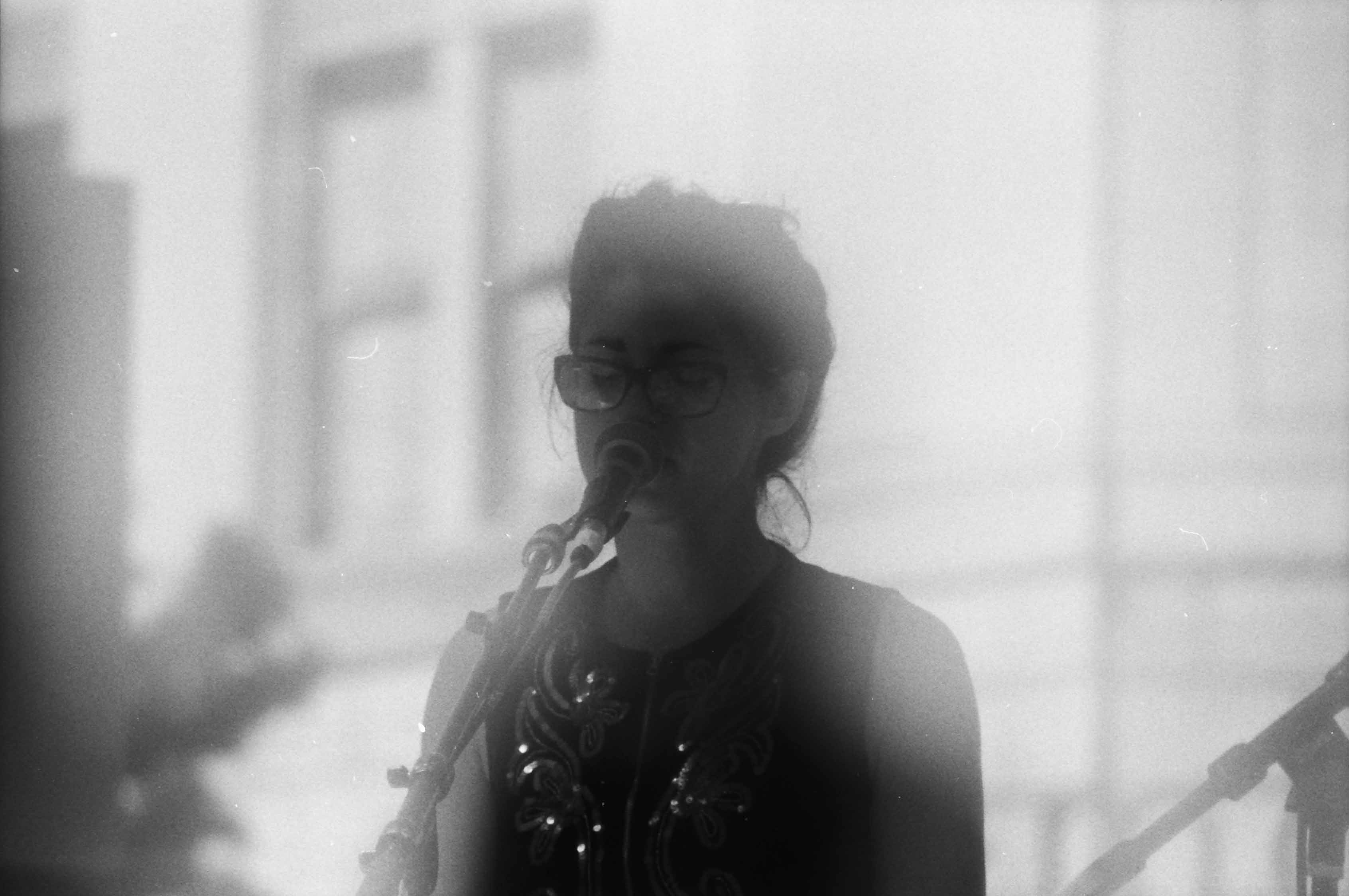

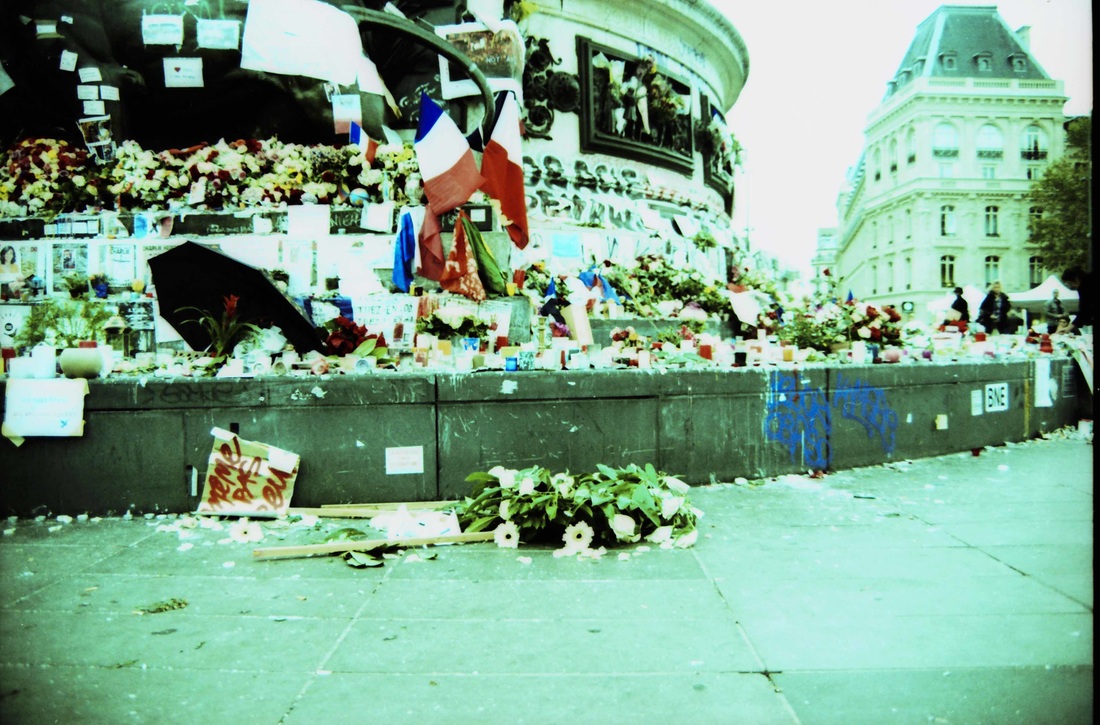
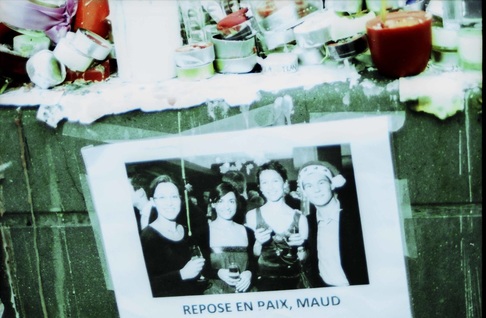
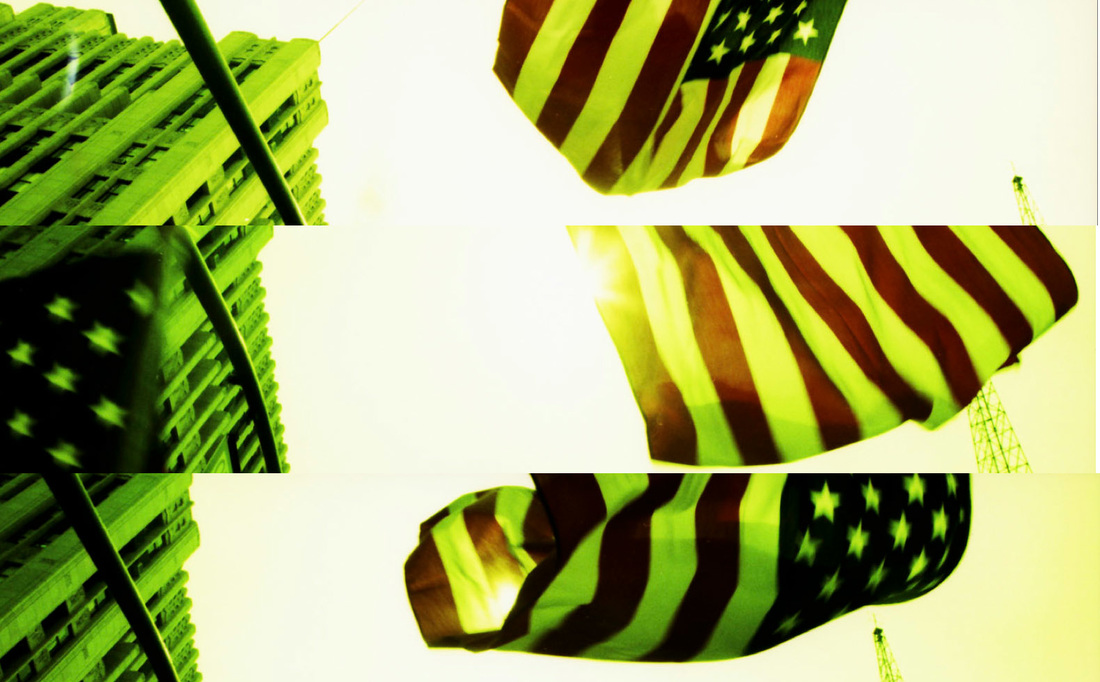
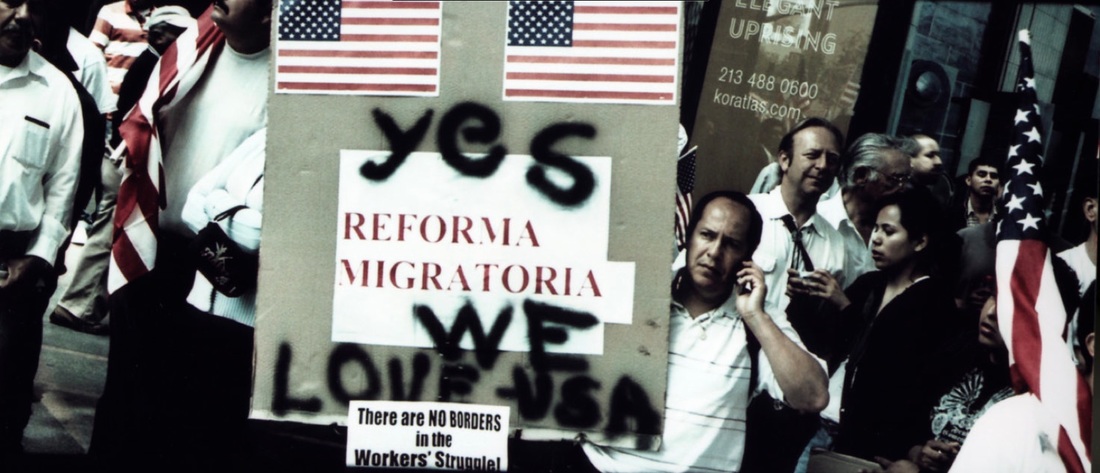
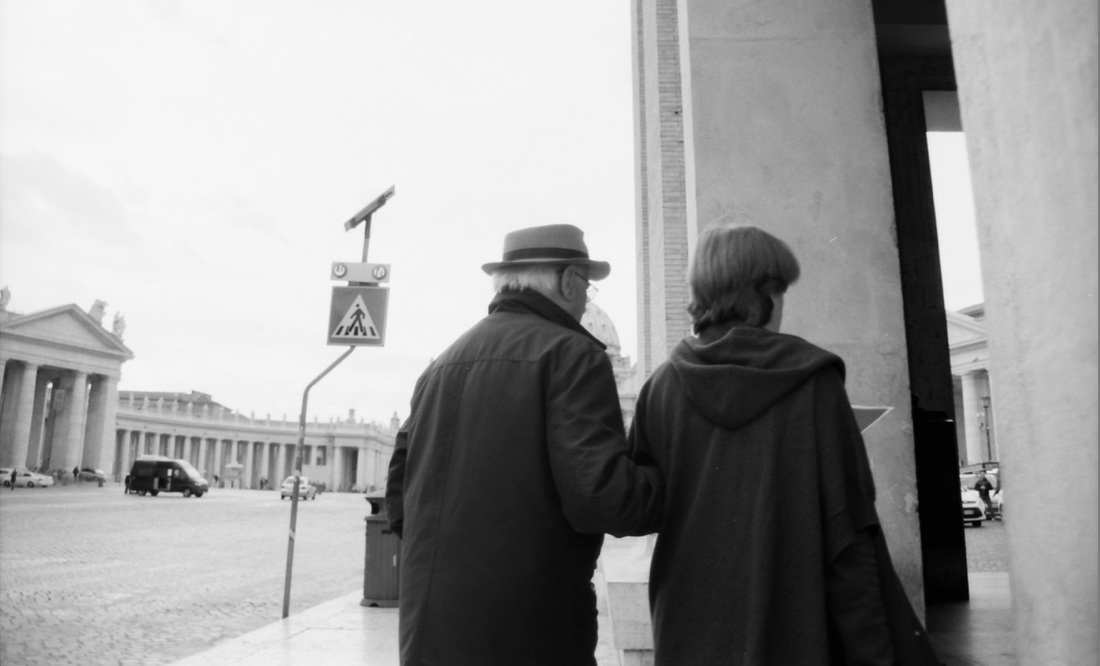
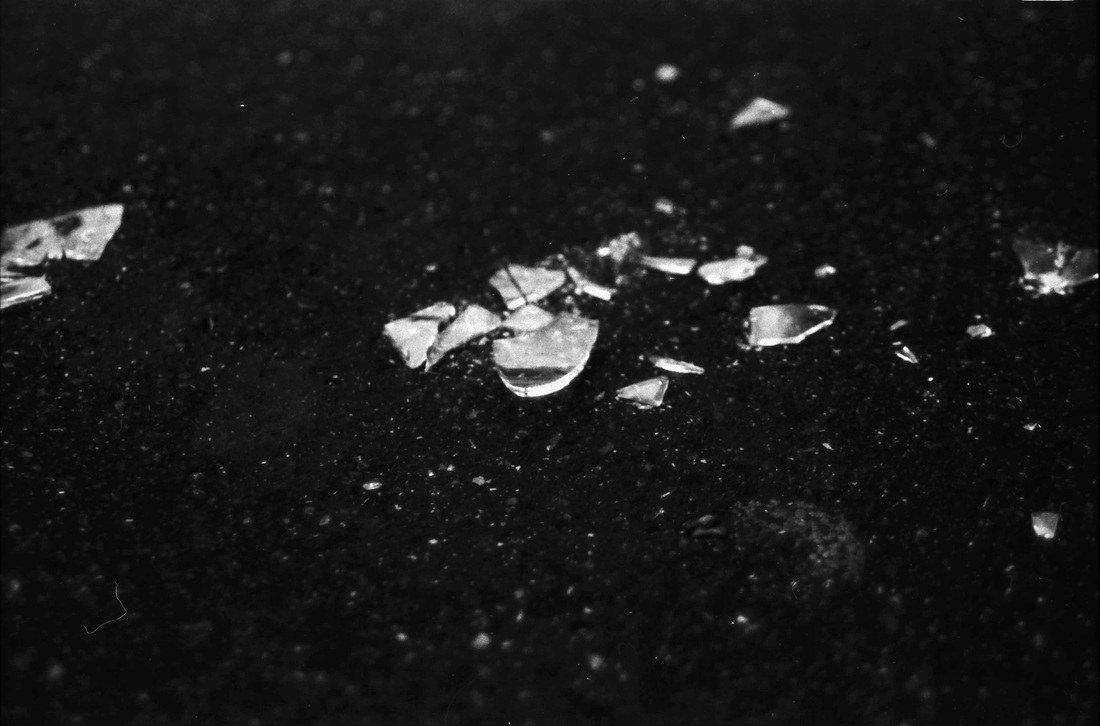


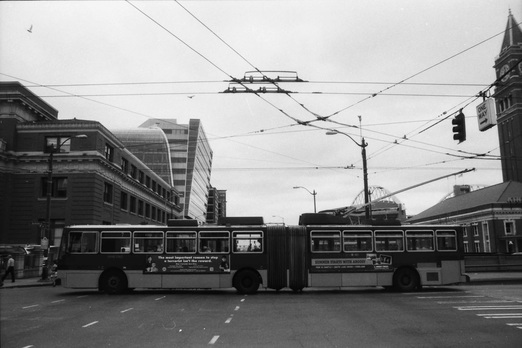
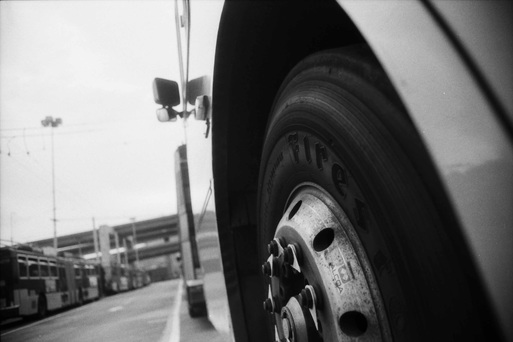

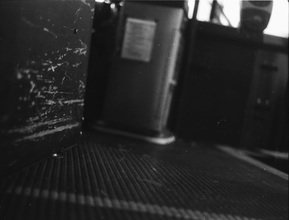
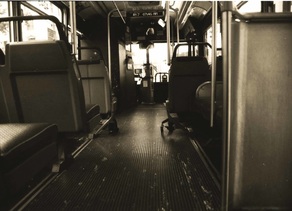

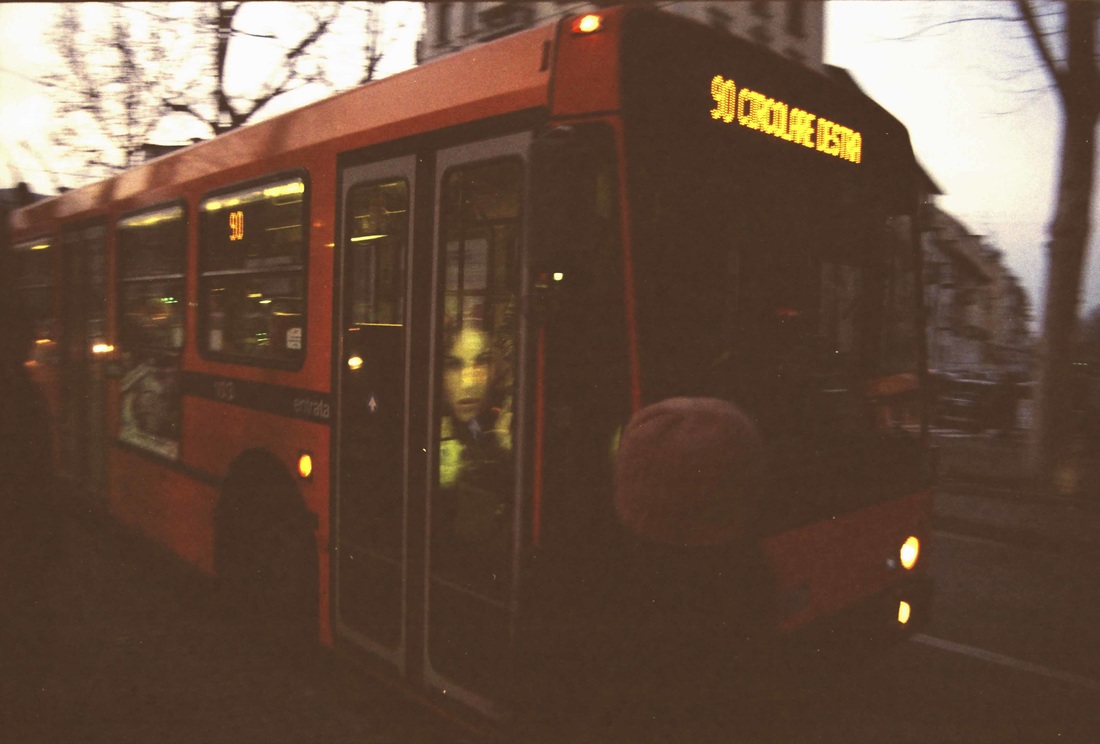
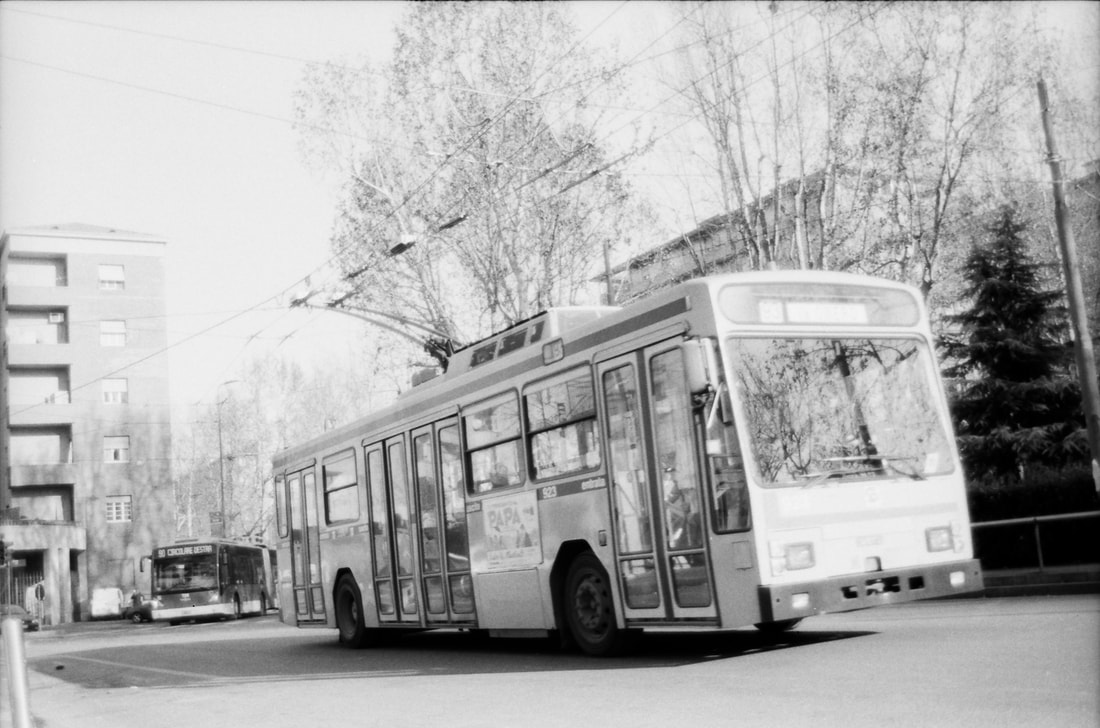
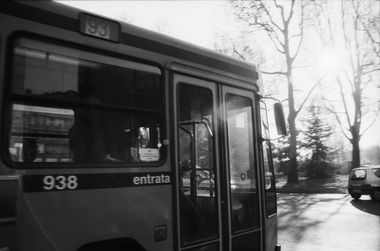
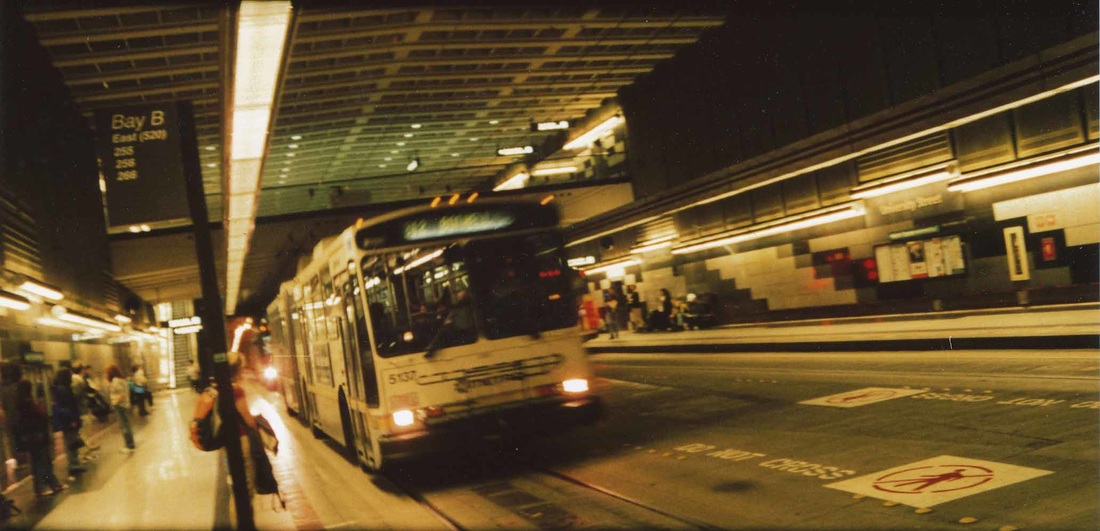

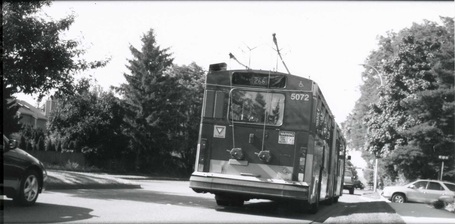
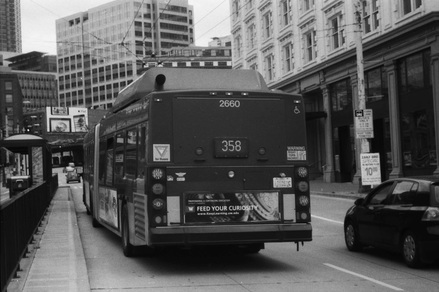
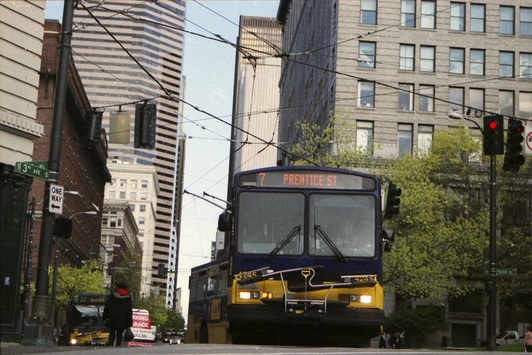
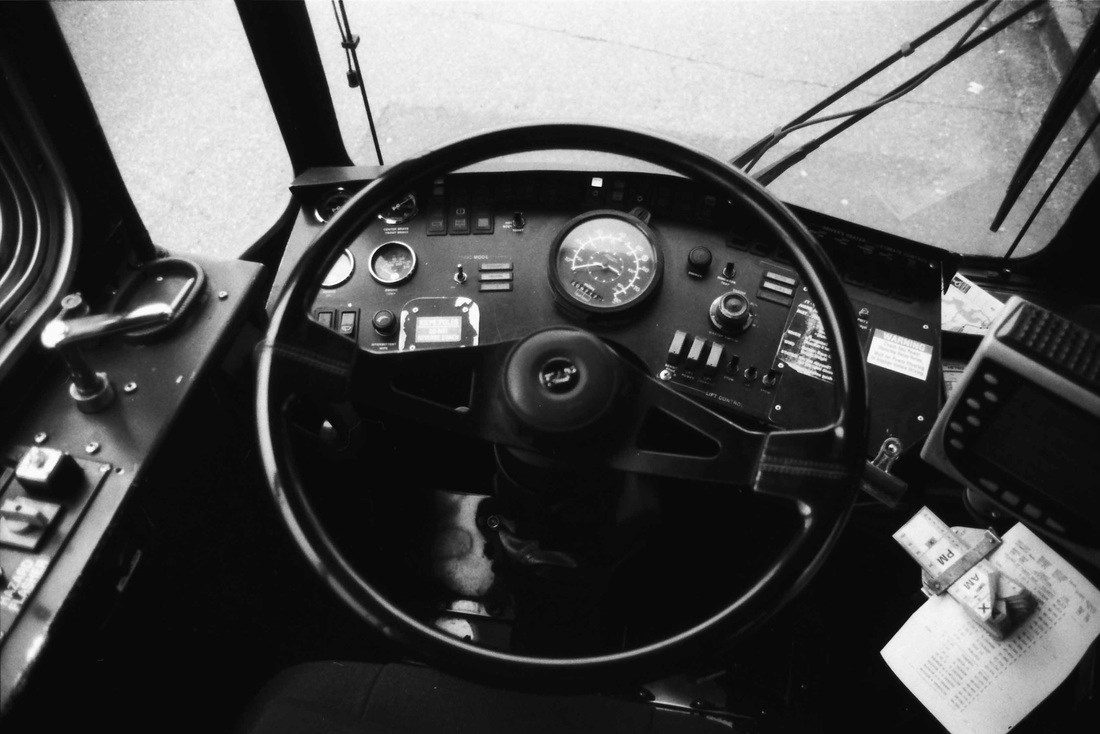
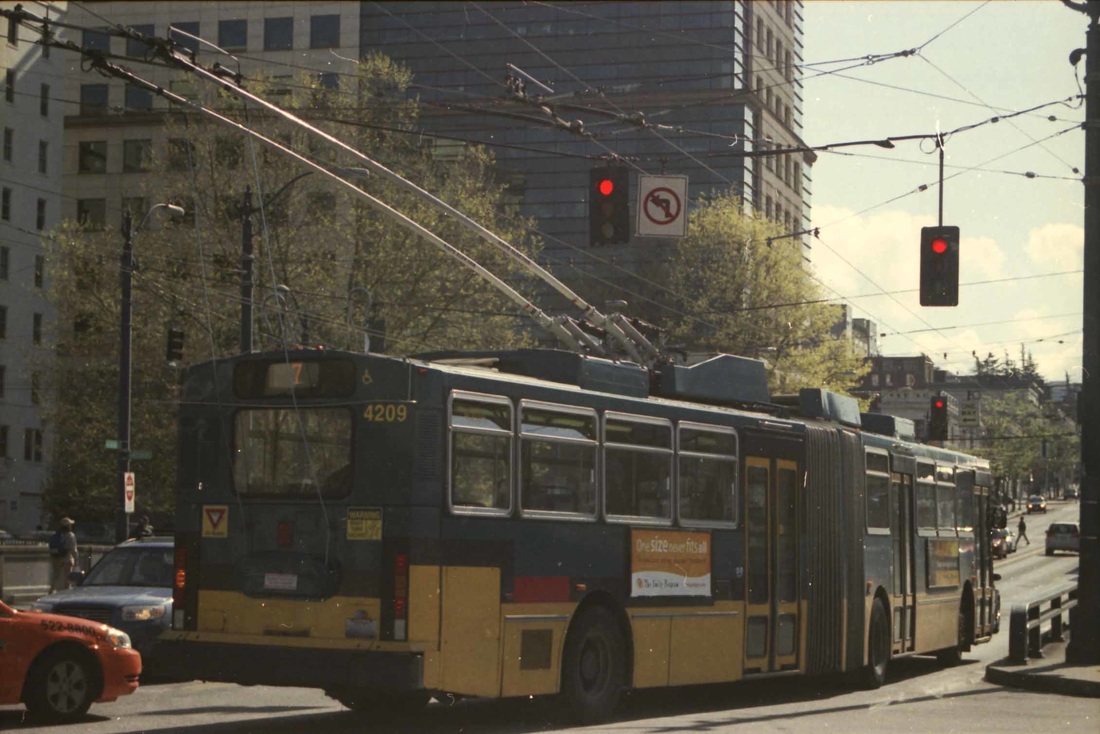
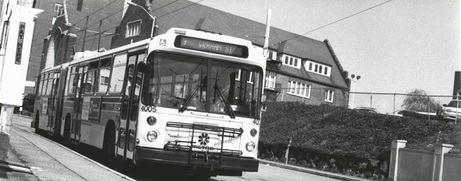
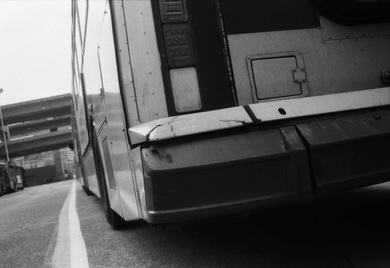
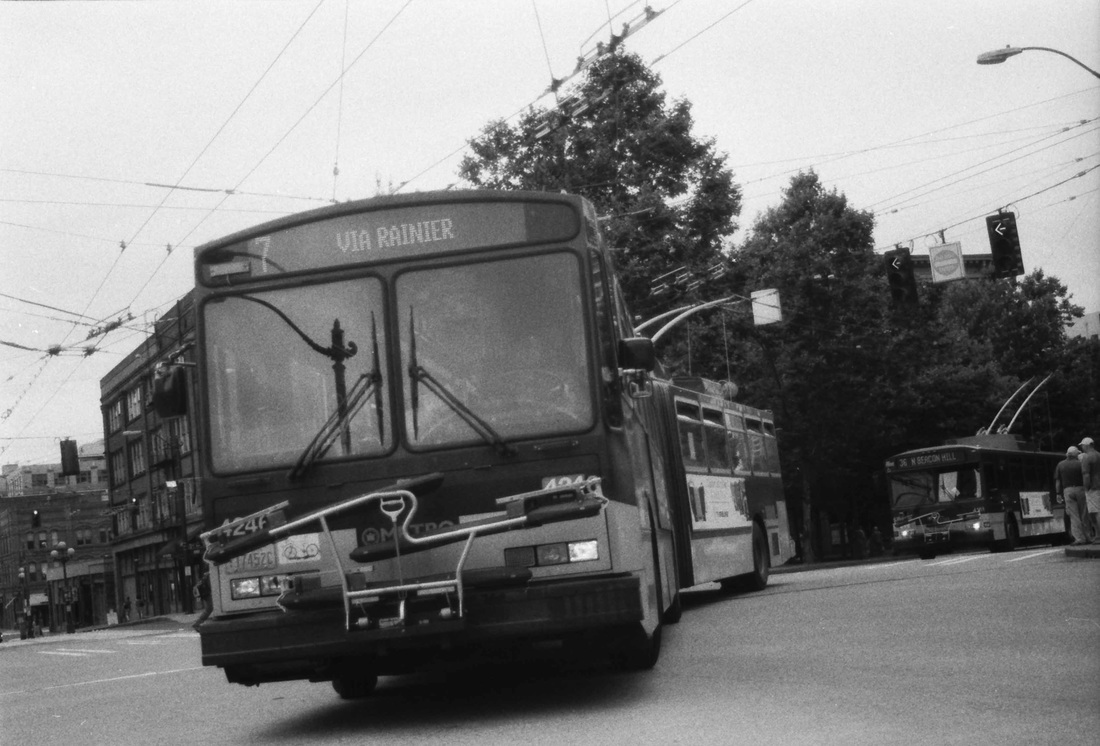
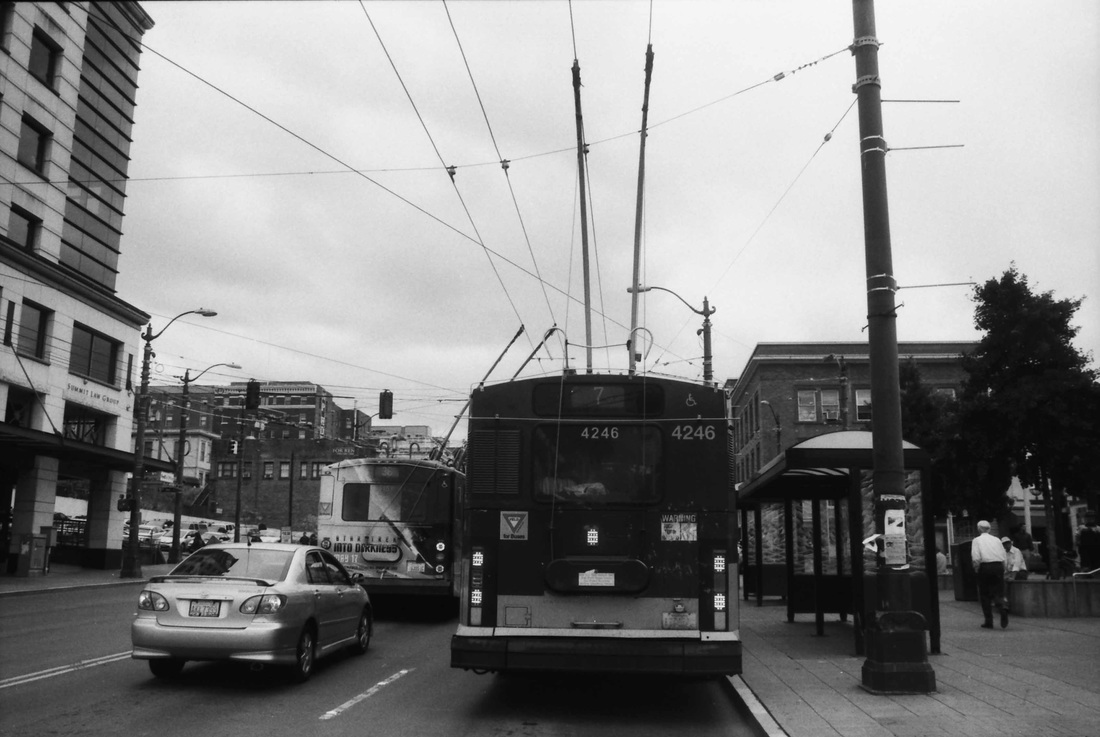
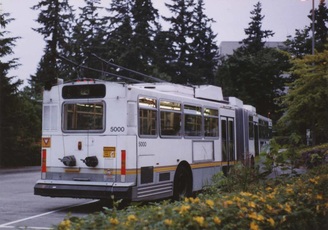
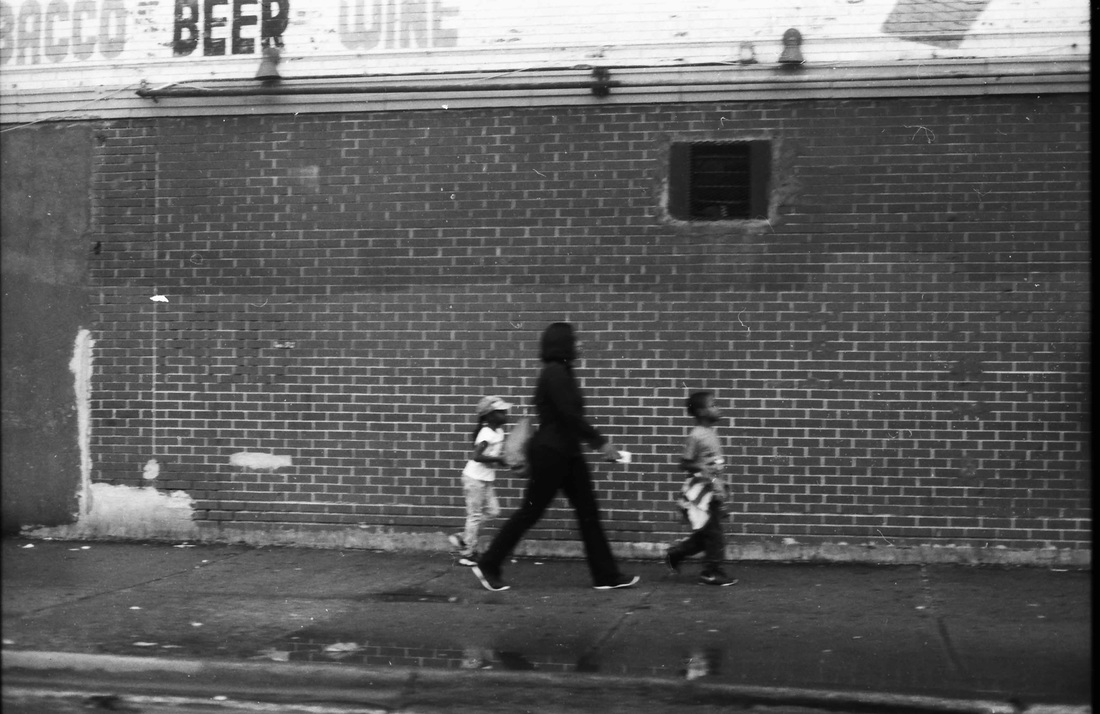
 RSS Feed
RSS Feed
